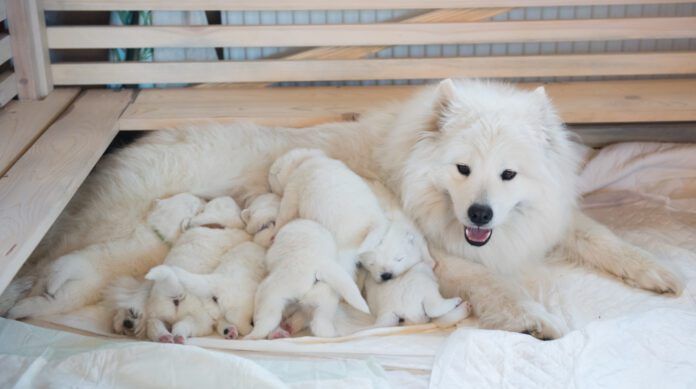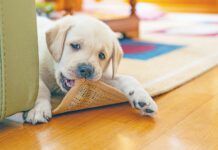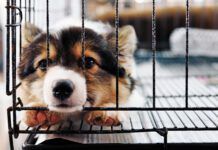Many people love the unique smell of puppy breath (myself included). Young puppies, especially in the first 4 months of life, have a particular aroma to their breath that is different from an adult dog’s breath. This smell usually fades by the time they turn 6 months old. But why does puppy breath smell bad?
We don’t really know why young puppies have such distinctive breath. The top theory is that it happens because these little guys are either only consuming milk or have only recently started eating solid food. The milk that they get from their mother could contribute to the aroma of puppy breath.
Other Reasons Puppy Breath Smells Bad
If your puppy truly does have bad breath, consider these potential causes:
- Eating poop. You read that right. Sometimes our puppies get confused as they are learning about solid food and eat their own or their siblings’ feces. The best way to resolve this behavior and stop it from becoming a habit is to pick up poop immediately so it isn’t available.
- Sometimes puppies can get bad breath as their deciduous teeth fall out and the permanent teeth erupt through their gums. Teething usually occurs around four to six months of age. Not every puppy will get bad breath during teething, but if your pup is in that age range, that could be the issue.
- Something is stuck in the puppy’s mouth. If your puppy gets a piece of food or a toy stuck in his teeth, over time it will rot and build up bacteria, resulting in a rancid odor. Be sure to check the roof of your puppy’s mouth for a fragment of a stick or toy stuck sideways. If you can’t get the offending item free, schedule a veterinary appointment.
- Dental disease. It is unusual for young puppies to have periodontal disease, but it is possible. Generally, puppies haven’t had the chance to build up the bacteria and calculus that cause dental disease and bad breath. Still, check to see if your puppy’s gums are red or bleeding, or if he has a broken tooth. You may also notice him pawing at his mouth or only chewing food on one side. If you think your puppy may have dental disease, schedule an appointment with your veterinarian to come up with a treatment plan.
How to Freshen Puppy Breath
As long as your puppy doesn’t have an underlying medical issue causing bad breath, you can help keep his puppy kisses pleasant by introducing tooth brushing. Choose an enzymatic toothpaste made for dogs. Your veterinarian may even have some free samples you can try.
For puppies who still have their baby teeth or who are teething, just let your puppy lick the toothpaste off a toothbrush once a day. This helps to build a positive association with the toothbrush, plus the enzymes in the toothpaste help prevent plaque from building up on the teeth. (Did you know PetSmile is the only canine toothpaste approved by the Veterinary Oral Health Council?)
You can start brushing your puppy’s teeth once he has stopped teething and has all his adult teeth. Start gradually by just touching the brush to one tooth a night, then build up over time. The American Veterinary Medical Association has a good video on how to brush your dog’s teeth.
If you’re not sure if your puppy’s breath is normal puppy breath, drop in to your veterinary clinic and offer puppy cuddles to staff members who love puppy breath. They can tell you how your puppy’s breath measures up, and if they say it isn’t normal, you can schedule an appointment right then.






